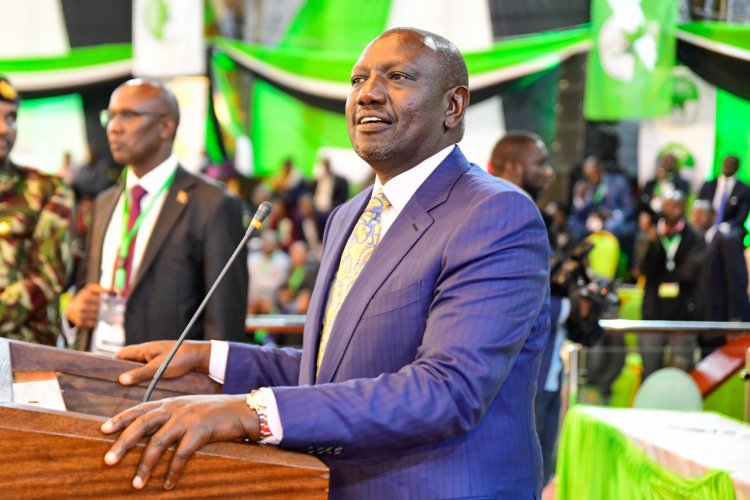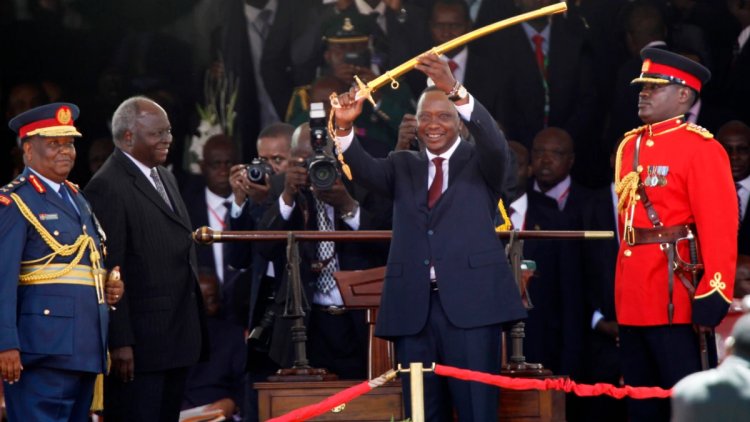Inside Ruto's New Powers, Perks As President-Elect
Plans were already underway in terms of his security following Independent Electoral and Boundaries Commission (IEBC) chairman, Wafula Chebukati's declaration that Ruto was the president-elect.

President-elect William Ruto is enjoying the supreme treatment that comes with being Kenya's president and is holding the role for the first time since it was handed to him temporarily.
In October 2014, he got his eventual first taste as a Head of State as acting President when Uhuru Kenyatta briefly relinquished power to attend to his criminal case at the International Criminal Court (ICC) in The Hague, Netherlands. Kenyatta's charges were later dropped.
Plans were already underway in terms of his security following Independent Electoral and Boundaries Commission (IEBC) chairman, Wafula Chebukati's declaration that Ruto was the president-elect.

Presidential escort in Kenya. /FILE
An Assumption of the Office of President Committee was established and has been commencing security plans ahead of his swearing-in as president, which is pending a potential petition by the losing Azimio coalition to the Supreme Court.
“Upon the declaration of the final results of a presidential election by the Commission under Article 138 of the Constitution and section 39 of the Elections Act (No. 24 of 2011), the Committee shall ensure that the President-elect and Deputy President-elect are accorded adequate security,” reads an excerpt from the Assumption of Office of the President Act 2012.
The current act sees Ruto's security heightened from 45 security officers from the Presidential Escort Unit (PEU) to over 200. Rigathi Gachagua, who now takes Ruto's place, is accorded 45 security officers.
Most of the officers come from the General Service Unit (GSU) and the respected Recce squad unit. They go through rigorous paramilitary training before they go on to execute their mandate.
Ruto will also now begin receiving security briefings from the National Security Council as requested.
“The Committee shall ensure that the President-elect under section 9 receives security briefings from the respective national security organs,” reads the Assumption of Office of the President Act 2012.
"The President-elect shall, in consultation with the Committee, carry out such preparations as may be necessary for the purpose of assuming office. The President-elect may, in carrying out preparations under subsection (1), request in writing for such information from a public officer as the President-elect may consider necessary," adds the Act.
It goes on to impose penalties on public officers who fail to provide information to the President-elect, such as a Ksh1 million fine or a jail term not more than two years, or both.
“A public officer from whom information is requested under subsection (2) shall provide the information within a reasonable time. (4) A public officer who fails to comply with the provisions of this section commits an offence and is liable, on conviction, to a fine not exceeding one million shillings or to imprisonment for a term not exceeding two years, or to both,” the act further states.
The Assumption of the Office of President Committee will consist of: the Secretary to the Cabinet who shall be the chairperson, the Attorney-General, the Cabinet Secretary of the Ministry of the registration of persons and immigration, the Principal Secretary in the Ministry of internal security, the Principal Secretary in the Ministry of Finance and the Principal Secretary in the Ministry of foreign affairs.
Others are the Principal Secretary in the Ministry of information and communication, the Principal Secretary in the Ministry of culture and social services, the Chief of the Kenya Defence Forces, the Director-General of the National Intelligence Service, the Inspector-General of the National Police Service, the person in charge of the administration of the affairs of the State House, the Clerk of the National Assembly, the Chief Registrar of the Judiciary.
Also included are three persons nominated by the President-elect. The Clerk of the Senate and the Secretary to the Intergovernmental Relations Secretariat, are appointed under the law relating to intergovernmental relations.

President Uhuru Kenyatta after taking over from the late former President Mwai Kibaki in 2013. /VOA NEWS

 admin
admin 




